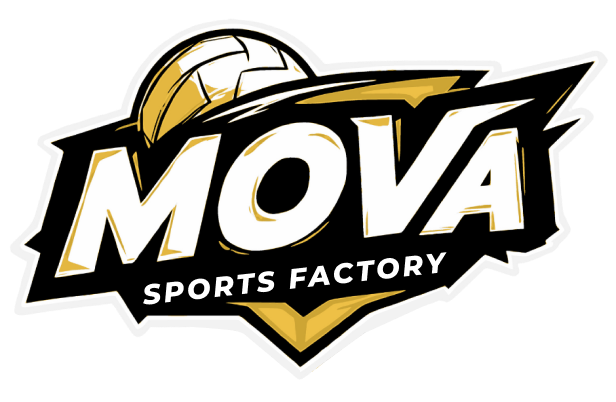
Upper Hand Biz Pod
Ep.02 | Lil Puckett & George Mdluli, MOVA

The impact of sports extends far beyond just the game.
For some, sports have afforded them the opportunity to get an education. For others, it keeps them on the right track in life. On the business side, it provides an opportunity to give back, or inspire future stars.
MOVA volleyball club was founded in 2013 as a result of all of these sports experiences. Duo Lil Puckett and George Mdluli were aware of the impact sports had on their lives, and made it their mission to create an inclusive, supportive environment that provides these opportunities for the next generation of athletes in the St. Louis area.
Kevin MacCauley recently sat down with Lil and George to discuss their business journey, from deciding to start their own club to taking the leap to open their own facility.
Here are some of the highlights.
Creating a Club that Feels like Family
From the very beginning, MOVA was about more than volleyball—it was about creating a supportive, family-like environment for young athletes. Lil and George both brought their unique backgrounds and love for sports into the foundation of the club. Having coached for other organizations, they saw firsthand the culture of exclusivity that permeated many clubs, especially in the sport of volleyball.
Determined to do things differently, they started MOVA with a mission to embrace diversity and make every player feel at home.
This strong sense of community is one of the club’s defining features. Players from all backgrounds are welcomed, and their growth is celebrated both on and off the court. Lil and George have been very intentional about fostering a culture where athletes can form lasting friendships and build confidence as they progress. It’s clear that for Lil and George, MOVA is not just a club but a family that supports each other through every high and low.
Key Takeaway: When building a sports club, consider how you can foster a sense of belonging. Ask yourself how your club can go beyond the game to create a lasting impact on players’ lives. By focusing on inclusion and community, you’ll build a foundation that players and families will want to be part of.
Leaning on Resilience in the Face of Adversity
Running a sports club is no small feat, and Lil and George have faced numerous challenges since founding MOVA. The pandemic put a particular strain on their operations, forcing them to make difficult decisions about whether to stay open. In a time when many clubs were shuttering their doors, MOVA made the courageous choice to keep going, offering their players a safe space to continue practicing and finding joy in their sport.
This decision wasn’t without risks. Staying open meant navigating health concerns and financial pressures, but Lil and George were guided by their commitment to their players and community. They recognized that for many of their athletes, the club was more than just a place to play volleyball—it was an essential part of their lives, providing structure, friendship, and a sense of normalcy in uncertain times. This resilience has become a cornerstone of MOVA’s identity.
Key Takeaway: In times of crisis, staying true to your mission can help you make tough decisions. Think about what your organization means to its members, and how you can continue to serve them, even when the path forward isn’t clear. Resilience is often the difference between a club that survives and one that thrives.
Owning a Sports Facility: A Leap of Faith with a High Reward
For many sports clubs, securing a dedicated facility is a dream. But it’s also a big leap—one that Lill and George took when they decided to purchase a facility for MOVA. This decision wasn’t without fear and sleepless nights. They had to navigate financial hurdles, weighing the risks of owning a space against the benefits of having a permanent home for their club.
At times, George and Lil found themselves working two to three jobs each in order to feel financially secure enough to make that jump. While Lil was stressed and anxious about the decision, George became that rock that believed the reward would one day outweigh the cost.
In the end, they realized that to grow MOVA, they needed a place they could call their own.
The facility has allowed MOVA to expand its programs, offering training and agility sessions alongside team practices. Having their own space has given them more control over their operations and the ability to build a strong sense of community. While the financial challenges of owning a facility are significant, Lil and George emphasize the rewards of taking that leap and creating a home base where their athletes can thrive.
Key Takeaway: If you’re considering owning a facility, weigh the pros and cons carefully. Owning your own space can offer stability and open up new opportunities for growth. However, it also requires a willingness to take risks and an understanding of the financial responsibilities involved. Having a clear vision for what you want to achieve can guide you through the process, as does seeking input and advice from financial professionals.
Finding Strength in Partnership
Lil and George’s relationship – and partnership – is central to MOVA’s success, as they are together nearly 24/7.
But, while they spend so much time together, they bring different strengths to the table. Lil handles much of the administrative side, while George focuses on coaching and operations. This balance has allowed them to tackle challenges from multiple angles, providing a strong foundation for MOVA’s growth. While they acknowledge that working together can sometimes be challenging, they also recognize that their shared commitment to the club and each other has helped them navigate tough times.
Their partnership extends beyond just the two of them. MOVA’s success is supported by a network of coaches, parents, and athletes who contribute to the club’s positive culture. Lil and George credit much of their success to this community, emphasizing the importance of building strong relationships and fostering a support network.
Key Takeaway: Building a successful sports organization requires teamwork. Identify partners who share your vision and complement your strengths. Whether it’s a co-founder, coaches, or supportive parents, having people who believe in your mission can make all the difference when facing challenges.
How MOVA Fosters Character Development in its Athletes
For MOVA, volleyball is as much about character development as it is about skill-building. Lil and George are passionate about teaching values like respect, discipline, and resilience. They’ve woven these principles into the fabric of their club, creating an environment where athletes learn valuable life lessons alongside sports techniques. This emphasis on values extends to their business decisions, too. Whether navigating financial difficulties or dealing with the pressures of COVID, Lil and George have always turned to their core values for guidance.
Their story is a reminder that sports can be a powerful vehicle for personal growth. At MOVA, players aren’t just learning to win—they’re learning to become better people. This commitment to values has resonated with parents and athletes alike, helping the club build a reputation as a place where young athletes can grow holistically.
Key Takeaway: Think about the values you want your organization to represent, and how you can integrate those into every aspect of your operations. By fostering character development in your athletes, you can make a lasting impact that goes beyond the game.
Lessons in Perseverance
Securing funding and managing finances are often the biggest challenges for new sports clubs. For Lil and George, the decision to purchase a facility meant facing financial uncertainty head-on. They sought advice from multiple sources, from business consultants to other club owners, to navigate these challenges. Despite the financial strain, they maintained a sense of faith that kept them grounded, allowing them to stay calm and focused even when the future seemed uncertain.
Their story highlights the importance of having a support system and being willing to ask for help. They credit their success not only to their own perseverance but also to the guidance and support they received from their community. Lil and George’s experience shows that while financial challenges are a part of building a business, you don’t have to face them alone.
Key Takeaway: Don’t be afraid to seek out advice and build a network of mentors and supporters. Financial challenges are a natural part of running a business, and having trusted advisors can provide the guidance you need to make informed decisions. Faith and a strong support system can help you stay the course during tough times.
How MOVA Became a Community-Driven Success Story
MOVA isn’t just a volleyball club—it’s a community. Lil and George have built an environment where players, coaches, and parents feel like part of a family. They emphasize that their journey wouldn’t have been possible without the unwavering support of those around them. From coaches who volunteered extra time to parents who provided financial guidance, the MOVA community has played a critical role in the club’s success.
Their story is a reminder of the power of community. By building strong relationships and creating an environment where people feel valued, MOVA has been able to weather challenges and grow into a thriving club. For Lil and George, success isn’t just about winning games—it’s about making a lasting impact on the lives of their athletes and creating a legacy of support and resilience.
Key Takeaway: When building a sports organization, consider how you can cultivate a community that supports each other. A strong network can provide not only financial and emotional support but also the motivation to keep going when things get tough. Creating a community-focused program can lead to lasting success that goes far beyond the scoreboard
Moving Forward
Lil and George’s journey offers valuable lessons for anyone looking to start or grow a sports club. Their story is one of perseverance, faith, and a commitment to building a community. By staying true to their values and focusing on the bigger picture, they’ve been able to overcome obstacles and create a club that makes a real difference.
For those considering their own path in sports club ownership, Lil and George’s advice is clear: Stay committed to your vision, surround yourself with people who believe in your mission, and never be afraid to ask for help. Building a successful sports club isn’t easy, but with resilience, community support, and a strong sense of purpose, it’s possible to create something truly impactful.
Building a sports club is about more than just skill and strategy—it’s about heart, resilience, and a commitment to your community. Embrace the journey, learn from the challenges, and focus on your business mission.

